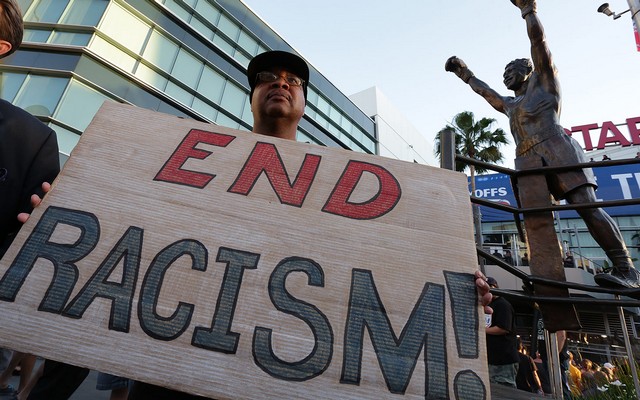By Mallika Kaur
Ignorance, regressive and regrettable as it may be, is not what’s maiming and killing us.
It doesn’t take an African American studies scholar to understand the travesty in what happened to 12-year-old Tamir Rice in Cleveland days before Thanksgiving 2014. It does not require a Sikh American expert witness to explain what’s wrong with the battery of 68-year-old Amrik Singh Balin Fresno the day after Christmas 2015. It certainly does not require a theologian to understand the immorality in gunning down parishioners, bombing a mosque, or shooting an immigrantstore clerk in the face.
The other day, a Jeep abruptly cut into my lane on a busy highway, veering in and out, the two men inside bent on having their obnoxious gestures acknowledged. As I gained composure and forgave myself for not catching their number plate, I had a moment of clarity about what we keep getting deathly wrong about hate acts: the role of ignorance.
Would you think that the men in the Jeep needed a “Know thy fellow driver” leaflet, explaining who I am, what I do, while promising peace? That I am brown—they could see. That I am a woman—was hardly lost on them, by their sexist gestures. They don’t have to know the waves of feminism from waves at a ballgame to know their actions were disrespectful. That was precisely their intention.
Yet each time there is an act of violent bigotry against a colored person rendered the ‘other,’ there is a rush to educate, explain, dispel myths, increase awareness. Each time led by the community of the victimized.
Ignorance is what I talk about in Cultural Competency trainings. Quit asking any Asian person if they love curry or complimenting any person of pigment on their ability to speak English with no accent or assuming the Latino man mowing his lawn is the hired help. Those are things we can laugh or rage over—depending on the day—and talk through, together.
Know what’s a conversation stopper?
“I don’t trust any of you. I’m going to get my AK47 and kill all of you.”A friend posted on Facebook the threat conveyed to him and his buddies on a train to Manhattan this Monday,by a woman with a young child.
It’s irrelevant whether the group of men wore turbans or not, had Sikh beards, biker beards, Muslim beards, shadow beards, or no beards. It doesn’t matter if my friend is a Harvard grad and Google employee or a cab driver. It’s not ignorance about them, or their actual privilege, that results in such acts of hate. It is the tacit understanding that such acts, if ever questioned, will be given a pass as ignorance or mistaken identity or some other misnomer, instead of being called out as bigotry or racism.
The child accompanying the woman terrorizing those subway riders in New York received a message that will take too many Awareness 101 presentations to undo. What amount of pointing to a handy globe, Asian sweets, and songs will undo the damning lesson on racism?
Could it be so simple as telling our children not to attack another regardless of what little we understand about the color of their skin, the sex of their partner, the choice of their dress, what gender-specific bathroom they prefer, which disease causes their weight gain or hair fall?
To be sure, cumulatively, ignorant acts pile up. The micro aggressions—Where are you really from?—are part of a macro system that thwarts potential. So we continue awareness-raising with the willing.
One of the many tiring obligations thrust on targeted people is to speak as one collective, with one story, preferable 140 characters or less. Awareness campaigns often lead to reductive understandings. When this understanding is shaken—as it will be—the onus again is on the community to make itself palatable.
I can’t tell you what every brown Sikh Punjabi American feminist woman lawyer believes. I can speak for myself. If you don’t happen to care about any or all of my identities, so be it. It might interest you to know though that each aspect of my identity makes each act of bigotry, against anyone, my business.
“Ignorance of each other is what has made unity impossible in the past… Once we have more knowledge (light) about each other…a United front will be brought about,” said Malcolm X. To be sure, we need to continue countering ignorance. But, let’s face it: ignorance is not making murderers, something else is. Say its name.
Mallika Kaur is a lawyer & writer who focuses on gender and minority issues in the U.S. and South Asia. She has a JD from The UC Berkeley School of Law and MPP from Harvard Kennedy School of Government.
**A version of this piece appeared in the Sacramento Bee on January 6, 2015.
07 January, 2016
Countercurrents.org

